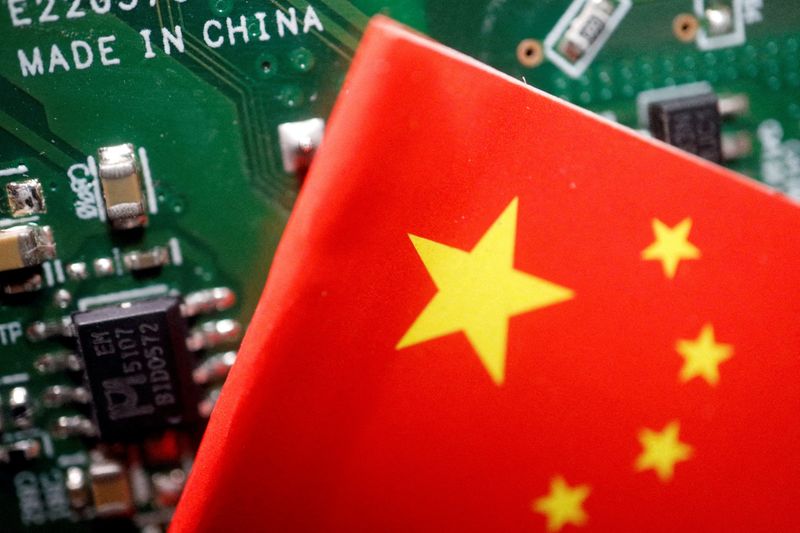
© Reuters. FILE PHOTO: A Chinese language flag is displayed subsequent to a “Made in China” signal seen on a printed circuit board with semiconductor chips, on this illustration image taken February 17, 2023. REUTERS/Florence Lo/Illustration/File Picture
By Stephen Nellis and Max A. Cherney
(Reuters) – In a brand new entrance within the U.S.-China tech battle, President Joe Biden’s administration is dealing with stress from some lawmakers to limit American firms from engaged on a freely obtainable chip know-how broadly utilized in China – a transfer that would upend how the worldwide know-how business collaborates throughout borders.
At challenge is RISC-V, pronounced “danger 5,” an open-source know-how that competes with expensive proprietary know-how from British semiconductor and software program design firm Arm Holdings (NASDAQ:). RISC-V can be utilized as a key ingredient for something from a smartphone chip to superior processors for synthetic intelligence.
Some lawmakers – together with two Republican Home of Representatives committee chairmen, Republican Senator Marco Rubio and Democratic Senator Mark Warner – are urging Biden’s administration to take motion relating to RISC-V, citing nationwide safety grounds.
The lawmakers expressed issues that Beijing is exploiting a tradition of open collaboration amongst American firms to advance its personal semiconductor business, which might erode the present U.S. lead within the chip area and assist China modernize its navy. Their feedback symbolize the primary main effort to place constraints on work by U.S. firms on RISC-V.
Consultant Mike Gallagher, chairman of the Home choose committee on China, stated in an announcement to Reuters that the Commerce Division must “require any American particular person or firm to obtain an export license previous to partaking with PRC (Individuals’s Republic of China) entities on RISC-V know-how.”
Such calls to control RISC-V are the newest within the U.S.-China battle over chip know-how that escalated final yr with sweeping export restrictions that the Biden administration has advised China it can replace this month.
“The CCP (Chinese language Communist Celebration) is abusing RISC-V to get round U.S. dominance of the mental property wanted to design chips. U.S. individuals shouldn’t be supporting a PRC tech switch technique that serves to degrade U.S. export management legal guidelines,” Consultant Michael McCaul, chairman of the Home International Affairs Committee, stated in an announcement to Reuters.
McCaul stated he needs motion from the Bureau of Trade and Safety, the a part of the Commerce Division that oversees export-control rules, and would pursue laws if that doesn’t materialize.
The bureau “is consistently reviewing the know-how panorama and menace atmosphere, and regularly assessing how finest to use our export management insurance policies to guard nationwide safety and safeguard core applied sciences,” a Commerce Division spokesperson stated in an announcement.
“Communist China is creating open-source chip structure to dodge our sanctions and develop its chip business,” Rubio stated in an announcement to Reuters. “If we do not broaden our export controls to incorporate this menace, China will at some point surpass us as the worldwide chief in chip design.”
“I concern that our export-control legal guidelines are usually not geared up to take care of the problem of open-source software program – whether or not in superior semiconductor designs like RISC-V or within the space of AI – and a dramatic paradigm shift is required,” Warner stated in an announcement to Reuters.
RISC-V is overseen by a Swiss-based nonprofit basis that coordinates efforts amongst for-profit firms to develop the know-how.
The RISC-V know-how got here from labs on the College of California, Berkeley, and later benefited from funding by the Pentagon’s Protection Superior Analysis Initiatives Company (DARPA). Its creators have in contrast it to Ethernet, USB and even the web, that are freely obtainable and draw on contributions from all over the world to make innovation sooner and cheaper.
HUAWEI TECHNOLOGIES
Executives from China’s Huawei Applied sciences have embraced RISC-V as a pillar of that nation’s progress in creating its personal chips. However the US and its allies even have jumped on the know-how, with chip large Qualcomm (NASDAQ:) working with a gaggle of European automotive corporations on RISC-V chips and Alphabet (NASDAQ:)’s Google saying it can make Android, the world’s hottest cell working system, work on RISC-V chips.
Qualcomm declined to remark. Its executives stated in August they imagine RISC-V will pace up chip innovation and rework the tech business.
Google didn’t reply to a request for remark.
If Biden’s administration had been to control U.S. firms’ participation within the Swiss-based basis within the method lawmakers are in search of, the transfer might complicate how American and Chinese language firms work collectively on open technical requirements. It additionally might create hurdles for China’s pursuit of chip self-sufficiency, in addition to for U.S. and European efforts to create cheaper and extra versatile chips.
Jack Kang, vice chairman of enterprise improvement at SiFive, a Santa Clara, California-based startup utilizing RISC-V, stated potential U.S. authorities restrictions on American firms relating to RISC-V could be a “large tragedy.”
“It could be like banning us from working on the web,” Kang stated. “It could be an enormous mistake by way of know-how, management, innovation and corporations and jobs which are being created.”
Regulating the open dialogue of applied sciences is rarer than regulating bodily merchandise, however not unimaginable, stated Kevin Wolf, an export-control lawyer at regulation agency Akin Gump who served within the Commerce Division beneath former President Barack Obama. Current guidelines on chip exports might assist present a authorized framework for such a proposal, Wolf stated.

